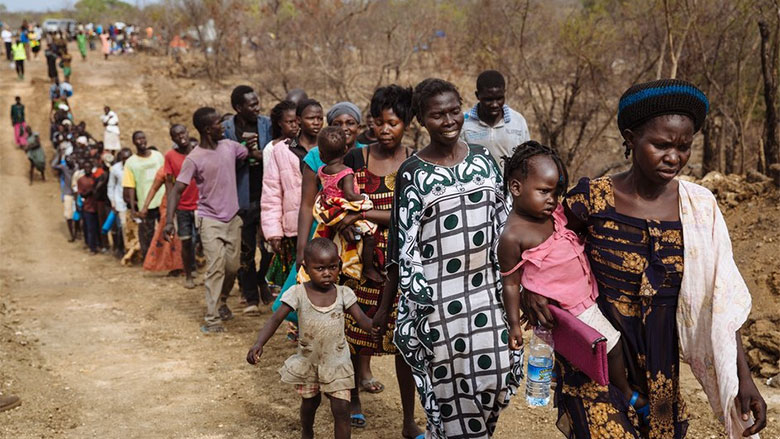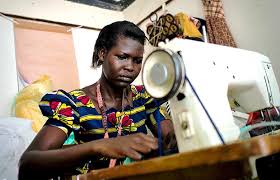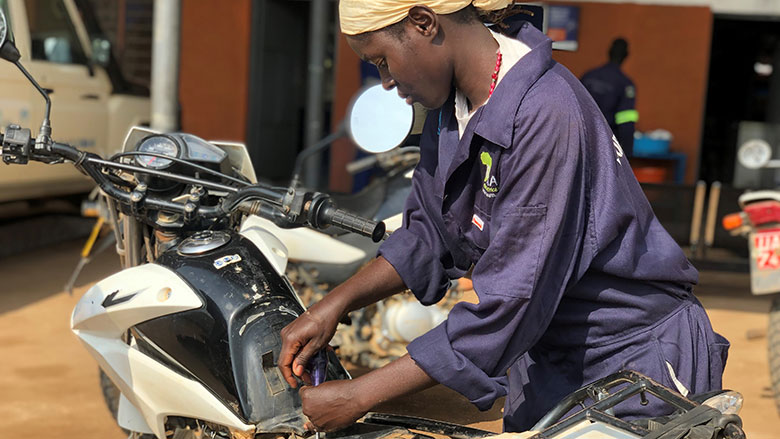Rose Kide, 25, from South Sudan is among over 20 women lining up to have their children immunized at Yoyo Health Centre III in Yumbe District, West Nile. The women in the queue are South Sudanese and Ugandans.
Kide who crossed into Uganda in December 2016 has had all her four children immunized. Three children were immunized in South Sudan while her three months’ son, Joel, is receiving immunization in Uganda. Kide and her family are settled in Bidibidi refugee settlement.
Asked why she immunizes her children, Kide says, “I want to protect my children from diseases that can kill them. The health workers told us diseases like measles, polio, can kill our children if they are not immunized.”
She is grateful to the health education provided by the health workers at Yoyo Health Centre and village health teams who visit the settlement. Kide believes that the regular community outreaches and public education acts as reminders for parents to participate in immunization activities.
“We are always reminded to come to the health centre to immunize our children. The health workers tell us about the importance of immunization and the dangers of not immunizing the children,” Kide explains.
Yoyo health centre serves a population of 17,589 from host communities and 65,000 South Sudanese refugees. The centre operates 24 hours.
UNICEF is working with the government through the Ministry of Health and District local governments to support new refugee arrivals with life-saving multi-sector assistance services like immunization. UNICEF is also supporting routine immunization services for refugees and host communities using various strategies such as outreaches, static and mini campaigns to address inequities surrounding immunisation service delivery.
With funding from UKaid, Government of Japan, UNICEF’s support has resulted into high coverage for measles and polio vaccination among South Sudanese refugees and host communities. As of October 31, 2017, 166,770 children had been immunized against Polio and 355,104 against measles both in refugee and host communities.
Funds from UKaid for immunization activities are targeting 40,000 children (refugee and host communities) aged 6 months to 15 years vaccinated for measles and 22,500 children aged 0-59 months vaccinated for polio in the districts of Arua, Adjumani, Isingiro, Lamwo, Moyo, Kamwenge, Kiryandongo, Koboko and Yumbe through routine and planned immunization activities. The support from UKaid also includes procurement and distribution of vaccines to districts hosting refugees to support routine and scheduled Supplementary Immunization Activities (SIAs), support health workers in refugee settlements to conduct outreaches and support districts hosting refugees to conduct social mobilization/community dialogues.
Moses Adomate, an enrolled nurse at Yoyo Health Centre three says immunization services were extended to the settlements through community outreaches to ensure ‘all children are immunized’. “To bring services closer to the population, we mentored health workers working in the settlements and in communities to conduct monthly outreaches. Five outreaches are conducted in host communities while nine are in Bidibidi refugee settlement,” he explains.
In addition to the community outreaches, “temporary health centres” were established in the settlements and communities effective August 2017. “Catchment areas where children have missed immunization were identified and temporary centres created to serve them. We are using Village Health Teams(VHTs) and Local ouncils to mobilise the parents, caregivers and guardians to bring the children at these centres. What we do is to have like 3 villages served by one temporary centre,” Adomote explains after immunizing Kide’s son and other children.
Adomate says health education has helped to bridge the gap adding that, “the refugees used to fear immunization. Whenever we would go to the settlements, they would run away. The situation has now improved and the coverage has also improved.”
With funding from the Government of Japan, UNCEF is procuring additional vaccines to ensure zero stock out in health facilities in Arua, Adjumani, Moyo and Yumbe districts and support outreaches to improve immunization coverage. In addition, the funds are supporting training of health workers within the refugee settlements in Effective Vaccine Management (EVM).
Yumbe District Ag. District Health Officer Daisy Olodriyo says the health workers have undergone training with support from UNICEF which has strengthened delivery of health services including immunization. “The community is now more aware of our immunization services and as a result, our immunization indicators in the district have improved,” she says.





























